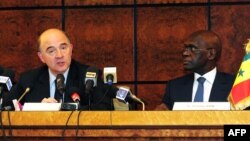DAKAR —
Representatives of the West and Central African Franc Zone say the CFA franc, which is currently pegged to the euro, will not be revaluated any time soon. This is despite concerns over mounting European financial troubles. The finance ministers of the 15 member countries met this week to discuss the future of the Franc Zone and the CFA.
The Bank of France, along with economic experts and the finance ministers of the 15 African countries in the Franc Zone, believe the current model of the Franc Zone remains relevant.
The Franc Zone is a monetary union of 14 French-speaking sub-Saharan African countries, along with France and the Comoros, whose currency is currently linked to the euro at a fixed rate of exchange.
Senegal’s Minister of Economy and Finance Amadou Kane said that despite the recent financial crisis in Europe, the tie between the CFA and the euro remains strong.
"For nearly 15 years, the CFA has been backed by the euro with no problems. It is a robust relationship," he said. "Besides, its value is more than just the exchange rate. We take into consideration monetary and financial policy."
The CFA was first anchored to the French franc back in 1945. It was later pegged to the euro when the European Union switched currencies in 1999.
Emmanuel Rocher, a representative of the Bank of France, says that pegging the CFA to the franc - and then the euro - has offered member countries an element of stability and security, particularly when it comes to foreign investment.
"Europe remains the largest commercial partner of the African Franc Zone," he said. "More than 60 percent of trade flows take place between the Franc Zone and Europe. I must add, that the member countries of the Franc Zone experienced economic growth that was six percent higher in 2012 compared to the previous year than other African countries that are not part of the zone."
The last time the CFA was revaluated was in January 1994, when member countries decided to devalue it by 50 percent. The decision was made based on mounting concerns that the exchange rate favored the African urban elite.
Although the devaluation temporarily caused a surge in local prices, the International Monetary Fund says that the revaluation ultimately promoted exports, expanded the agricultural sector in many countries, and made the countries' local products more competitive in international markets.
Kane says member countries will consider revaluating it in the future, if necessary.
The next meeting of the Franc Zone finance ministers will take place in October.
The Bank of France, along with economic experts and the finance ministers of the 15 African countries in the Franc Zone, believe the current model of the Franc Zone remains relevant.
The Franc Zone is a monetary union of 14 French-speaking sub-Saharan African countries, along with France and the Comoros, whose currency is currently linked to the euro at a fixed rate of exchange.
Senegal’s Minister of Economy and Finance Amadou Kane said that despite the recent financial crisis in Europe, the tie between the CFA and the euro remains strong.
"For nearly 15 years, the CFA has been backed by the euro with no problems. It is a robust relationship," he said. "Besides, its value is more than just the exchange rate. We take into consideration monetary and financial policy."
The CFA was first anchored to the French franc back in 1945. It was later pegged to the euro when the European Union switched currencies in 1999.
Emmanuel Rocher, a representative of the Bank of France, says that pegging the CFA to the franc - and then the euro - has offered member countries an element of stability and security, particularly when it comes to foreign investment.
"Europe remains the largest commercial partner of the African Franc Zone," he said. "More than 60 percent of trade flows take place between the Franc Zone and Europe. I must add, that the member countries of the Franc Zone experienced economic growth that was six percent higher in 2012 compared to the previous year than other African countries that are not part of the zone."
The last time the CFA was revaluated was in January 1994, when member countries decided to devalue it by 50 percent. The decision was made based on mounting concerns that the exchange rate favored the African urban elite.
Although the devaluation temporarily caused a surge in local prices, the International Monetary Fund says that the revaluation ultimately promoted exports, expanded the agricultural sector in many countries, and made the countries' local products more competitive in international markets.
Kane says member countries will consider revaluating it in the future, if necessary.
The next meeting of the Franc Zone finance ministers will take place in October.




